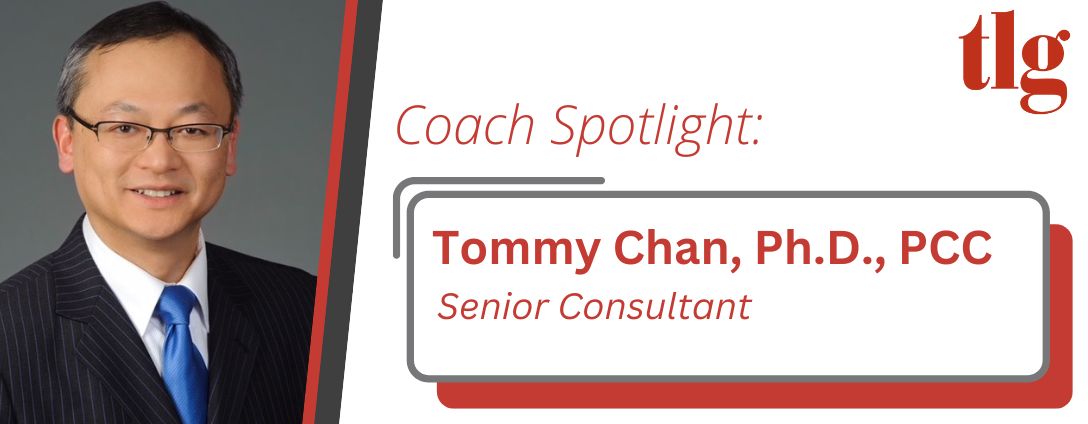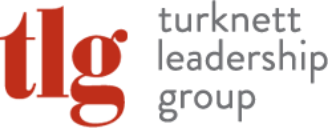
By TLG
Tommy Chan, Ph.D., is on a mission to help professionals around the world grow and achieve what they aim to accomplish and become who they want to be as business leaders. Read this edition of our coach spotlight series to learn more about Tommy Chan’s background, career highlights, and more.
Q: How has your experience as a trained psychologist influenced your coaching practice? What advantages has it lent you?
My psychologist training at Michigan State University in the late 80’s and early 90’s helped prepare me to scientifically assess, understand, and strategize with my coaching clients in an evidence-based approach. Many empirical research findings and anecdotal observations in optimizing executive performance in business have been published since my Ph.D. training. One advantage of being a trained psychologist is to comprehend these latest and complex scientific discoveries and be able to decipher and apply them for the best interest of coaching clients. Another advantage as a psychologist-turned-coach is that I am more prepared to understand the developmental history and its impact on the coachee’s decision-making and behavioral tendencies. Psychologists are formally trained to effectively support clients and make recommendations based on a thorough assessment of coaching clients’ backgrounds and propensities.
There are sometimes motivations and behavioral patterns in one’s history they are unaware of, and that may impede or enhance optimal executive performance. Although I do not conduct therapy in coaching, my training as a psychologist helps equip my understanding of important psychodynamic issues that may affect one’s work performance. Helping coaching clients to uncover and work through significant experiences could lead to breakthroughs in overcoming blind spots and maladaptive habits, thus unlocking many of my coaching clients’ potential.
Q: Tell us a little bit about your international background as a coach.
I came to the US from Hong Kong as a teenager and have been married to an Australian for over three decades. Based in Atlanta, I traveled for work extensively in the US, the Asia-Pacific region, and sometimes Europe before the Pandemic. I accumulated invaluable international experiences in supporting US and international business leaders over the years. Although there is still a lot to learn about people from various backgrounds, I am grateful that my cross-cultural working experiences with clients from multinational corporations (MNCs) helped me to be more effective in connecting with a diverse clientele. I am equipped to help leaders effectively lead international teams who may be different from themselves. In addition to primarily coaching in English, my fluency in Mandarin and Cantonese also helps support Chinese-speaking coachees who prefer to receive coaching in their mother tongue.
Q: What is your top career highlight? What did you learn from it?
One of the highlights of my coaching career was efficaciously coaching a senior executive in the Finance industry. He was perceived as a “poster boy” of success, as projected in his executive presence including his immaculate attire with three-piece tailor-made suits, accessorized with silk pocket squares. He literally carried the image of someone who would be featured in Success Magazine. However, based on his 360 assessment results and anecdotal feedback at the beginning of coaching, this coachee’s “perfection” ironically made him less impactful. His team reportedly found him to be intimidating, distant, unapproachable, and sometimes discouraging, as many of his team members found it impossible to be like him or come close to achieving his level of success. Some high-potential members of his team left the company. This coachee was caught unaware that what he had intended to project and accomplish as a leader was literally achieving the opposite results.
Through a period of honest analysis and reflection of these data points in a confidential and safe environment in coaching, this coachee gradually became more relaxed, approachable, and learned to communicate rapport and trust while acquiring important EQ skills. He gradually made headways in building connections and trusting relationships. Consequently, he became more natural and effective in bringing out the best among his direct reports, mostly financial analysts, instead of seizing all the limelight for himself. His team performance overall was noticeably improved and the attrition rate in his team was reportedly reduced toward the end of coaching. This could happen only after nurturing trust at the beginning phase of the coaching process, despite initial resistance.
Learnings
I learned that being willing to persistently confront a coachee’s difficult blind spots, clarifying benefits when blind spots are overcome and elucidating misunderstandings about leadership, is vital in leading to positive coaching and business outcomes. This is analogous to the fact that sometimes one may need to walk in the opposite direction of the intended destination to get to the closest subway station to catch the proper train. Although walking away from the direction of the destination initially could seem unnatural or counterintuitive, one would eventually get to the destination speedily once the right train is caught.
Q: What is it about coaching and leadership development that you enjoy the most?
I enjoy seeing my coachees grow and achieve what they aim to accomplish and become who they want to be as business leaders. I appreciate the challenge that effective coaching intrinsically brings around complexity and unknowns. However, the professional rewards and satisfaction of positive coaching outcomes are significant. Successful coaching involves many underlying predictive factors (just to name a few, though not exhaustive), such as establishing a connection, trust building, active listening, communication of understanding and helping coachees feel understood, facilitating good strategy formation in problem-solving, possessing updated industry knowledge, referencing successful case scenarios, having astute business acumen, good EQ skills, being effective as a thinking partner and confidant, not being afraid to ask tough questions and holding coachees accountable, etc.
In other words, I enjoy the opportunity of playing the role of “Sherlock Holmes,” as though working as an investigator, in coaching to help coachees decipher what are not obvious, or hidden underlying factors, that stop them from achieving their best. Not unlike what sporting coaches would do to enhance athletic performance, I also enjoy offering timely cheering, encouragement, and inspirational support in the coaching process because it makes a positive difference.
Q: Tell us about the scientific strengths-based and action-learning approach that you use to help develop your clients.
Scientific studies consistently show that we learn the most and the quickest by taking right, small, and incremental actions based on good analysis. Without being willing to take the first step of new action to change, we tend to perpetuate the status quo even with accurate and targeted intellectual insights. Without translating good ideas into behavioral changes, the impact of new understanding would not make a difference in business outcomes. In my action-learning coaching approach, I assist my coachees in accelerating their leadership growth by taking small, palatable, and achievable steps to grow and develop themselves until the momentum of a positive feedback loop is formed.
Many best-selling business leadership books such as Atomic Habits by James Clear and Slight Edge by Jeff Olson have succinctly illustrated these critical scientific principles in leadership development. In addition, effective leadership maxims based on research, such as the 80/20 rule, inform us that business leaders develop the best when building upon what they are already good at, optimally allotting 80% of priorities to activating strengths, and 20% to remedial learning to narrow developmental gaps. This well-documented approach is the most efficient way to deploy limited resources to achieve maximum impact. I find the strength-based action-oriented coaching approach to be the most effective and efficient in developing my clients.

